Unit1Wheredidyougoonvacation(SectionA1a-2d)教案(人教新目标八年级上册)
站前区六中八年级英语上册Unit1WheredidyougoonvacationSectionA第1
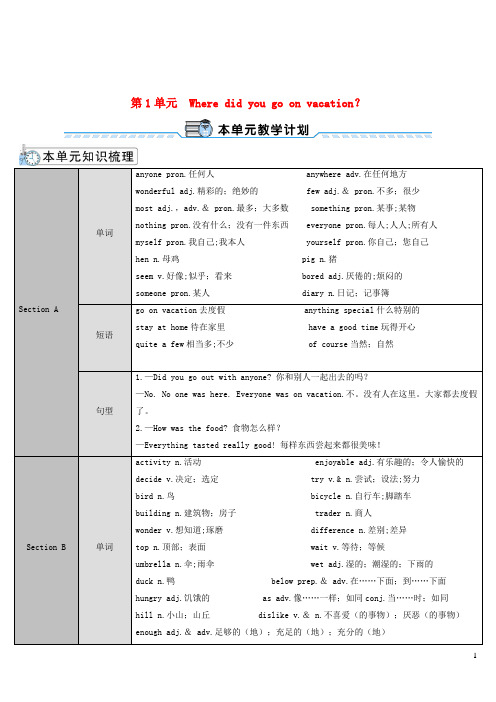
第1单元 Where did you go on vacation?Section A 单词anyone pron.任何人 anywhere adv.在任何地方wonderful adj.精彩的;绝妙的 few adj.& pron.不多;很少most adj.,adv.& pron.最多;大多数 something pron.某事;某物nothing pron.没有什么;没有一件东西 everyone pron.每人;人人;所有人myself pron.我自己;我本人 yourself pron.你自己;您自己hen n.母鸡 pig n.猪seem v.好像;似乎;看来 bored adj.厌倦的;烦闷的someone pron.某人 diary n.日记;记事簿短语go on vacation去度假 anything special什么特别的stay at home待在家里 have a good time玩得开心quite a few相当多;不少 of course当然;自然句型1.—Did you go out with anyone? 你和别人一起出去的吗?—No. No one was here. Everyone was on vacation.不。
没有人在这里。
大家都去度假了。
2.—How was the food? 食物怎么样?—Everything tasted really good! 每样东西尝起来都很美味!Section B 单词activity n.活动 enjoyable adj.有乐趣的;令人愉快的decide v.决定;选定 try v.& n.尝试;设法;努力bird n.鸟 bicycle n.自行车;脚踏车building n.建筑物;房子 trader n.商人wonder v.想知道;琢磨 difference n.差别;差异top n.顶部;表面 wait v.等待;等候umbrella n.伞;雨伞 wet adj.湿的;潮湿的;下雨的duck n.鸭 below prep.& adv.在……下面;到……下面hungry adj.饥饿的 as adv.像……一样;如同conj.当……时;如同hill n.小山;山丘 dislike v.& n.不喜爱(的事物);厌恶(的事物)enough adj.& adv.足够的(地);充足的(地);充分的(地)短语feel like给……的感觉;感受到 because of因为arrive in到达 a lot of许多;大量的take some photos拍一些照片 too many太多句型1.There are a lot of new buildings now, but many of the old buildings are still there. 现在那里有许多新的建筑物,但是许多老式的建筑物还在那里。
八年级上册Unit1WheredidyougoonvacationU1SectionA

第一课时Section A (1a-1c)Step 1自主学习【新词自查】汉译英。
1.待在家里__stay__at__home__2.去纽约城__go__to__New__York__City__3.看望我的叔叔__visit__my__uncle__4.去夏令营__go__to__summer__camp__5.去爬山__go__to__the__mountains__6.去海滩__go__to__the__beach__7.参观博物馆__visit__museums__Step 2情景导入【参考案例】T:What did you do last Sunday?Ss:…T:Today we are going to learn how to talk about the past events.设计意图:从询问全班学生的休息日情况入手,让学生初步理解对过去事情的谈论以及其基本结构。
激发学生学习本单元的兴趣,自然地导入新课。
Step 3完成教材1a-1c的任务【操作案例】1.要求学生翻开课本P1,理解1a中短语的意思,并按要求完成课本上相应的任务。
T:What can you see in the picture? Each picture shows something a person did in the past.Now,please match each phrase with one of the pictures.2.检查答案,先要求几名同学给出他们的不同意见,并全班一起讨论,让学生进一步理解1a中动词或动词短语的过去式。
3.要求学生听第一遍录音,并完成课本上1b的听力任务。
T:Listen to the recording.There are three conversations.The people talk about what they did on vacation.Listen to the recording and write the numbers of the names in the right boxes in the picture.4.让几个学生说出自己的答案。
原八年级英语上册Unit1Wheredidyougoonvacation(第1课时)SectionA

16.Grace went to Renmin Park.(改为否定句)
didn't go
Grace_______ _____to Renmin Park.
17.Mary visited her English teacher yesterday.(改为一般疑问句)
__D_i_d__Mary __v_i_s_i_t her English teacher yesterday?
三、单项选择(xuǎnzé)。
( A )11.________ did you go on Sunday afternoon?
A.Where
B.Who
C.What
( )12.—How ________ you ________ your winter vacation? C
—I visited Wuhan.
2.—Why didn't you visit the museum yesterday?
—Because I had to stay ______a_t__home and do my homework.
3.Tom and Lily went _______t_othe beach to relax last summer.
第二页,共10页。
②on vacation意为“在度假中”。on在这里意为“……进行(jìnxíng)中;在……中; 处于……状态”,表示状态。 eg:The clothes are on sale.这些衣服正在出售。 【拓展】vacation指学校、机关、团体正式规定的假期,一般时间较长,不包括周末 或仅仅一天的休息日,多用于美式英语;而在英式英语中常用holiday。
二、根据句意,选用(xuǎnyòng)was,were,did填空。 6.What___d_i_d__ they do on vacation last month?
Unit1WheredidyougoonvacationSectionA1a-2d课件人教版八年级英

went to summer camp
stayed at home
went to the mountains
went to New York City
went to the beach
visited museums
去海滩 去爬山 待在家里 拜访/看望…老师
去度假 参观博物馆 去参加夏令营
Kevin swim?
√
meet
anyone
√
interesting?
No, I didn’t
√
Learn to walk before you run
2d Role-play the conversation.
A: Hi, Helen. Long time no see. B: Hi, Rick. Yes, I was on vacation last month. A: Oh, did you go anywhere interesting? B: Yes, I went to Guizhou with my family. A: Wow! Did you see Huangguoshu Waterfall? B: Yes, I did. It was wonderful! We took quite a few photos there. What about you? Did you do anything special last month? A: …
week . 上周我们在北京。 否定句:主语+wasn’t /weren’t+其他。
It wasn’t a good trip. 这不是一次很好的旅行。
一般疑问句:
Was/Were+主语+其他?
八年级上unit1wheredidyougoonvacationsectionA1
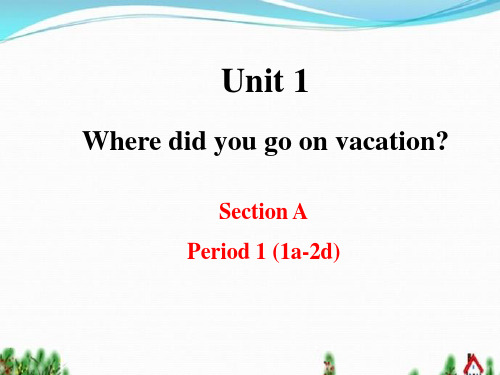
2d Role-play the conversation.
People
Places
Grace New York City (Central Park) Kevin the beach Julie stayed at home
2b Listen again. Check (✔) Yes, I did or No, I didn’t for each question.
visited museums
Where did you go on vacation?
went to summer camp
1a Match the activities with the pictures [a-g].
Where did you go
on vacation?
I went to the
Where did you go on vacation?I went to
the
2mountai 1 ns.
4
53
1. Tina 2. Xiang Hua
3. Sally
4. Bob
5. Tom
1c
A: What did Tina go on vacation? B: She went to the mountains.
do anything
✔
Julie interesting?
study for tests? ✔
go out with anyone?
✔
Talk about your vacation plans with your friends and fill in the chart.
Name Vacation plans Who? When?
八年级英语人教版上册Unit1Wheredidyougoonvacation?SectionA1a

1a Match the activities with the pictures [a-g].
1. stayed at home _f_ 2. went to New York
City _b_ 3. visited my uncle _g_
4. went to summer
camp _d_
5. went to the
写出下列动词的过去式:
stay _s_t_a_y_e_d__ live __li_v_e_d___
3
study _s_tu__d_ie_d__ stop _s_to_p_p__e_d_
归纳规则动词变为过去形式的规则:
1.一般在词尾直接+ed;
2.以不发音字母e结尾直接+d;
3.辅音字母加y结尾的动词,变y为i再+ed;
Guessing Where did I go on vacation this summer?
went to Yunnan
What did I do there?
saw some beautiful waterfalls
What did you do in your summer vacation?
3. Peter _w_e_n_t_ (go) to the summer camp 2 years ago.
Rush to answer(快速作答)
6
我的英语老师去年去过纽约市。
My English teacher went to New York City last year.
Lucy在周末为考试而做准备。 Lucy studied for tests on the weekend.
No, I didn't
Unit1WheredidyougoonvacationSectionA1a-1c全英文教案
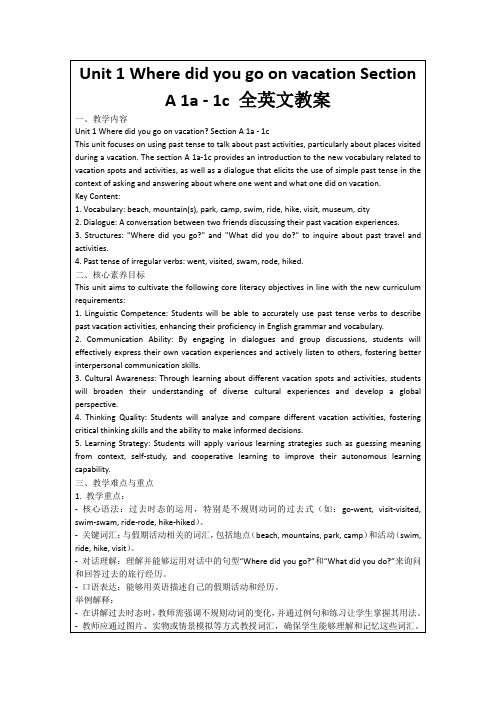
二、核心素养目标
This unit aims to cultivate the following core literacy objectives in line with the new curriculum requirements:
1. Linguistic Competence: Students will be able to accurately use past tense verbs to describe past vacation activities, enhancing their proficiency in English grammar and vocabulary.
-对话理解的教学可以通过角色扮演、听力练习等形式进行,让学生在实际语境中学会如何提问和回答。
2.教学难点:
-难点一:不规则动词过去式的记忆和应用。
-学生通常对不规则动词的变化感到困难,需要通过记忆技巧、重复练习和实际应用来加强记忆。
-难点二:正确使用过去时态构造句子。
-教师需要帮助学生理解过去时态的构成,并指导他们如何在不同情境下构造正确的句子。
(二)新课讲授(用时10分钟)
1.理论介绍:首先,我们要了解过去时态的基本概念。过去时态是用来描述已经发生的事情的时态,它是英语中非常重要的一部分,帮助我们讲述过去的经历。
2.案例分析:接下来,我们来看一个具体的对话案例。这个案例展示了过去时态在实际中的应用,以及它如何帮助我们描述旅行活动。
Unit1wheredidyougoonvacation(SectionA1a-1c)教案

1.加强对动词过去式的专项训练,通过有趣的练习和游戏,帮助学生更好地记忆和运用。
2.提高听力和口语练习的难度,逐步增加学生的语言输入和输出机会,提高他们的实际应用能力。
3.在小组活动中,注意观察每个学生的参与情况,及时给予指导和鼓励,确保每个学生都能在活动中得到锻炼和提高。
五、教学反思
在今天的教学中,我发现学生们对于一般过去时态的概念和应用有了初步的理解,但仍然存在一些挑战。在导入新课环节,通过询问学生的假期经历,我发现大多数学生能够积极参与,这为后续的教学活动打下了良好的基础。
在讲授新课的过程中,我发现有些学生对动词过去式的变化规则掌握不够牢固,这是需要我在今后的教学中进一步强调和巩固的地方。通过案例分析,学生们似乎对听力材料中的过去时态用法有了更直观的认识,但在实际对话练习中,部分学生在时态运用上仍然显得有些犹豫和不确定。
(二)新课讲授(用时10分钟)
1.理论介绍:首先,我们要了解一般过去时态的基本概念。一般过去时态是用来描述过去发生的事情或状态的时态。它是英语学习中非常重要的时态之一,因为它帮助我们描述和回顾过去的事件。
2.案例分析:接下来,我们通过听力练习来看一个具体的案例。这个案例展示了如何使用一般过去时态来描述假期活动,以及它如何帮助我们与他人分享过去的经历。
Unit 1 where did you go on vacation(Section A 1a-1c)教案
一教学内容
《Unit 1 Where did you go on vacation (Section A 1a-1c)》主要包括以下内容:1a部分通过图片展示和问题引导学生谈论假期的旅游地点;1b部分通过听力练习,让学生掌握询问和回答假期活动的目标语言;1c部分则通过小组活动,让学生互相询问和分享彼此的假期经历,巩固本节课所学语言知识。教学内容紧密结合教材,旨在让学生在实际语境中运用一般过去时态描述过去发生的事情,锻炼其听说能力和交际能力。
Unit1Wheredidyougoonvacation-SectionA1a-2c教案

今天的教学过程让我有了很多思考。在讲解《Unit 1 Where did you go on vacation?》这一章节时,我发现学生们对一般过去时态的理解和应用存在一些困难。尤其是在不规则动词的过去式和听力理解方面,学生们表现得不够自信。
首先,我觉得在教授一般过去时态时,采用生动的案例和情境教学是非常有效的。通过让学生们描述自己的假期经历,他们能够更直观地理解一般过去时态的用法。然而,我也注意到,部分学生在运用这个时态时仍然感到困惑,特别是在不规则动词的过去式上。在今后的教学中,我需要更加注重对这部分内容的讲解和练习。
(三)实践活动(用时10分钟)
1.分组讨论:学生们将分成若干小组,每组讨论一个与假期活动相关的实际问题,如:“How to describe a visit to the beach using the past tense?”
2.实验操作:为了加深理解,我们将进行一个简单的角色扮演活动。这个活动将演示如何在实际对话中使用一般过去时态。
3.成果分享:每个小组将选择一名代表来分享他们的讨论成果。这些成果将被记录在黑板上或投影仪上,以便全班都能看到。
(五)总结回顾(用时5分钟)
今天的学习,我们了解了一般过去时态的基本概念、重要性以及在描述过去活动中的应用。同时,我们也通过实践活动和小组讨论加深了对一般过去时态的理解。我希望大家能够掌握这些知识点,并在日常对话中灵活运用。最后,如果有任何疑问或不明白的地方,请随时向我提问。
(3)一般过去时态:本节课的核心语法为一般过去时态。教师应通过实例和练习,使学生掌握一般过去时态的构成和用法。
举例:解释一般过去时态的构成,如动词过去式的变化规则,以及不规则动词的过去式形式。
2.教学难点
(1)一般过去时态的运用:学生在实际语境中运用一般过去时态时,容易与现在时态混淆。教师应设计丰富的实践活动,帮助学生区分并正确运用一般过去时态。
Unit1WheredidyougoonvacationSectionA1a-1c课件人教版八年级英

d
c
g
a
e
f
1. Tina2. Xiang Hua3. Sally4. Bob5. Tom
4
5
3
2
How was your summer vacation?Where did you go on vacation?
It was
boring
just so so
great/excellent/wonderful
There are five people in this group. Most of them had a great vacation. Tina went to the mountains with her family.Everyone had a good time and everything was excellent. Xiang huan went to New York city Sally did nothing just stayed at home Bob did something interesting . He visited his uncle and went fishing ,it was interesting. Tom went to summer camp with his friends. All in all ,everyone had a good time but Sally。
1. 呆在家2. 去纽约市3. 拜访我的叔叔4. 去夏令营5. 去爬山6. 去海边7. 参观博物馆
Let’s challenge
stay/stayed at homego/went to New York Cityvisit/visited my unclego/went to summer campgo/went to the mountainsgo/went to the beachvisit/visited museums
八年级英语上册Unit1《Wheredidyougoonvacation》SectionA1a-1c教学案(新版)人教新目标版

Mrs. Peter always carried an umbrella.彼得太太过去老是带着一把伞。
及时练习:用be动词的适当形式填空
①I _______ at school just now.
② He ________ at the camp last week.
③ We ________ students two years ago.
9.My mother ________________ (not do) houseworkyesterday.
10.She watches TV every evening. But she ______ (not watch) TV last night.
用括号内动词的正确形式填空
Last year Mr. Smith _____ (go ) toChinaandJapan. He _____ (have)a
2. students guess their activities.
3. finish the task:
4. check the answers.
5. students read and know themmeaning of thispassage.
四、总结(引深探究 15分钟)
I、语法:一般过去时态的运用
Step1c
师生、生生操练
Where did you go on vacation? I went toNew York City.
Did yougo out with anyone?No, No one was here. Everyone was on vacation.
Did you buy anything special? Yes, I bought something for my father.
Unit1Wheredidyougoonvacation_SectionA(1a–1c)课件人教版八
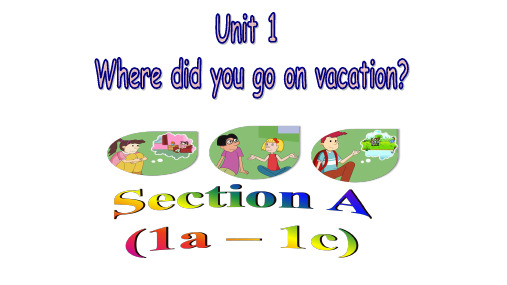
Name
Activities
Tina Xiang Hua
went to the mouFra bibliotektains went to New York City
Sally
stayed at home
Brad
visited his uncle
Tom
went to summer camp
Report like this:
2.Master the words in this unit and pre-view next part.
Where did they go on vacation?
They went to summer camp. /kæmp/
露营地, 阵营
Where did they go on vacation?
They went to the museum. 博物馆
Where did you go on vacation? I went to Beijing City.
On vacation, Tina went to the mountains. It was … Xiang Hua … It was…
1c
Where did Tina go on vacation?
Make conversations about the people in the picture.
汉译英.
1.呆在家里 stay at home
2.去夏令营 go to summer camp
3.去爬山
go to the mountains
4.参观博物馆 visit the museum
5.去度假
go on vacation
初中英语八年级上册Unit1WheredidyougoonvacationSectionA1a-1c优秀PPT课件

词,与之相对应的复合不定代词 anyone,
someone, no one 和everyone ( anybody,
somebody, nobody 和 everybody) 用于指人。
与形容词连时, 形容词必须放在复合不定 代词之后,语法上称作“后置”。例如: something important—— 重要的事
Where did they go on vacation?
They went to summer camp. /kæmp/
露营地, 阵营
Where did they go on vacation?
They went to the museum. 博物馆
Where did you go on vacation?
动词过去式 went stayed
动词原形 go stay visit do
visited
did
was
had
is have
1) 与go to the mountains结构类似的词组还有:
go to the beach 去海边
go to summer camp 去夏令营 go to New York City 去纽约市 go on vacation 去度假 go to a trip 去旅行 go to the movies 去看电影
3. I stayed at home. 我呆在家里。
1) stay可以作及物动词, 也可以作不及 物动词。当它作不及物动词时就不能直接 接宾语, 其后接相应的介词短语, 表地点 (留在某地)或表状态(保持某种状态)。
e.g. stay in the office 继续任职 (掌权)
八年级英语上册Unit1Wheredidyougoonvacation(第1课时)SectionA

八年级英语上册Unit 1 Where did you go on vacation(第1课时)Section A(1a-2d)课时测试题(新版)人教新目标版编辑整理:尊敬的读者朋友们:这里是精品文档编辑中心,本文档内容是由我和我的同事精心编辑整理后发布的,发布之前我们对文中内容进行仔细校对,但是难免会有疏漏的地方,但是任然希望(八年级英语上册Unit 1 Where did you go on vacation(第1课时)Section A(1a-2d)课时测试题(新版)人教新目标版)的内容能够给您的工作和学习带来便利。
同时也真诚的希望收到您的建议和反馈,这将是我们进步的源泉,前进的动力。
本文可编辑可修改,如果觉得对您有帮助请收藏以便随时查阅,最后祝您生活愉快业绩进步,以下为八年级英语上册Unit 1 Where did you go on vacation(第1课时)Section A(1a-2d)课时测试题(新版)人教新目标版的全部内容。
Unit 1 Where did you go on vacation?Unit 1第1课时Section A (1a-2d)测试时间:15分钟测试日期:年月日学生姓名:分数: /15I。
根据句意及首字母提示完成句子1。
Where did he go on v ?2. I didn't speak to a because I wanted to keep a secret.3。
How w the beach?4. I v a museum last month.5. I lost my pen。
I can’t find it a 。
6。
What did these people t of their vacations?7. She went to the m on vacation.8. My parents w to Shanghai last week.9. We had a w dinner at the restaurant。
八年级上册Unit1WheredidyougoonvacationSectionA
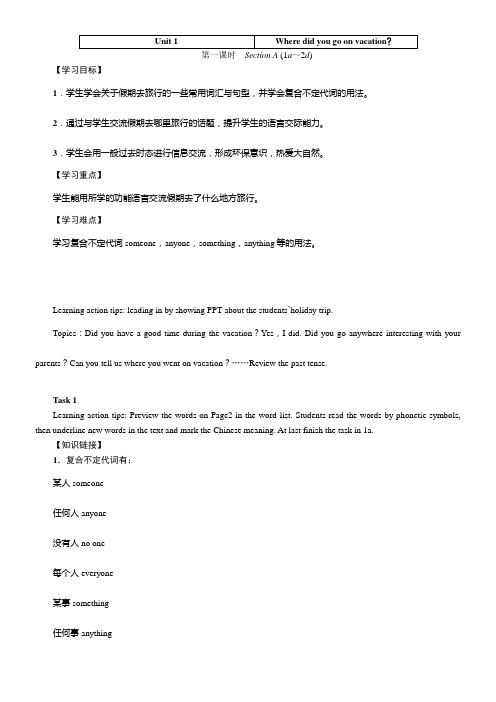
第一课时Section A (1a~2d)【学习目标】1.学生学会关于假期去旅行的一些常用词汇与句型,并学会复合不定代词的用法。
2.通过与学生交流假期去哪里旅行的话题,提升学生的语言交际能力。
3.学生会用一般过去时态进行信息交流,形成环保意识,热爱大自然。
【学习重点】学生能用所学的功能语言交流假期去了什么地方旅行。
【学习难点】学习复合不定代词someone,anyone,something,anything等的用法。
Learning action tips: leading in by showing PPT about the students’holiday trip.Topics:Did you have a good time during the vacation?Yes,I did. Did you go anywhere interesting with your parents?Can you tell us where you went on vacation?……Review the past tense.Task 1Learning action tips: Preview the words on Page2 in the word list. Students read the words by phonetic symbols, then underline new words in the text and mark the Chinese meaning. At last finish the task in 1a.【知识链接】1.复合不定代词有:某人someone任何人anyone没有人no one每个人everyone某事something任何事anything没有东西nothing一切everything2.anyone与any one的区别anyone通常指人,侧重于个体,后面不带of;any one既指人,又指物,侧重于整体,后面可接of。
八年级英语上册Unit1Wheredidyougoonvacation第1课时S
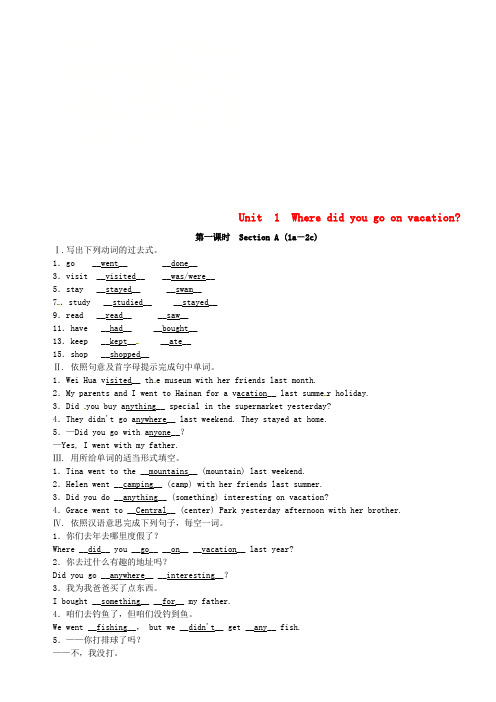
Unit 1 Where did you go on vacation?第一课时Section A (1a-2c)Ⅰ.写出下列动词的过去式。
1.go __went__ __done__3.visit __visited__ __was/were__5.stay __stayed__ __swam__7.study __studied__ __stayed__9.read __read__ __saw__11.have __had__ __bought__13.keep __kept__ __ate__15.shop __shopped__Ⅱ. 依照句意及首字母提示完成句中单词。
1.Wei Hua visited__ th e museum with her friends last month.2.My parents and I went to Hainan for a vacation__ last summe r holiday.3.Did you buy anything__ special in the supermarket yesterday?4.They didn't go anywhere__ last weekend. They stayed at home.5.—Did you go with anyone__?—Yes, I went with my father.Ⅲ. 用所给单词的适当形式填空。
1.Tina went to the __mountains__ (mountain) last weekend.2.Helen went __camping__ (camp) with her friends last summer.3.Did you do __anything__ (something) interesting on vacation?4.Grace went to __Central__ (center) Park yesterday afternoon with her brother.Ⅳ. 依照汉语意思完成下列句子,每空一词。
- 1、下载文档前请自行甄别文档内容的完整性,平台不提供额外的编辑、内容补充、找答案等附加服务。
- 2、"仅部分预览"的文档,不可在线预览部分如存在完整性等问题,可反馈申请退款(可完整预览的文档不适用该条件!)。
- 3、如文档侵犯您的权益,请联系客服反馈,我们会尽快为您处理(人工客服工作时间:9:00-18:30)。
曾国藩实验学校Unit 2 How often do you exercise?The First Period (Section A1a-2d)Teaching aims1.To master the new words : housework, hardly, ever, once, twice, Internet, program, full, swing2.To master the key phrases: help with housework, hardly ever, on weekends, go to the movies, once a week,twice a week, once a month, twice a month, three times a week, use the Internet, be free, next week, swing dance, have piano lessons, have to3.To master the key sentences:What do you ususlly do on weekends?How often do you exercise?How often do you watch TV?.I watch TV twice a week.Are you free next week?Next week is quite full for me.What kind of dance are you learning?Teaching importances and difficultiesTo be able to talk about how often you do things.Teaching aids: Tape recorder , computer or multimediaTeaching proceduresStep1 Greeting and lead inGreet the students as usual.Look at the pictures on the screen, ask the students about the following question:What do you usually do o n weekends? Do you …on weekends?Then let students talk about their weekend activities with each other.Step 2 PresentationPresent the studying aims on the blackboard or on the screen. Let the students know what they will learn in this lesson.Step 3 Self-study (Ⅰ)Read the new words and phrases on Pages9-10 aloud and learn them by yourselves. Then look at the picture in 1a on Page 9 and make a list of the weekend activities.Step 4 GroupworkRead the new words and phrases aloud in groups. Memorize the new words and phrases with a group.Check the weekend activities you’ve written down with each other. Talk about the weekend activities with groups.Step 5 Listening11. Listen to the tape in 1b carefully and write the activities next to the correct frequency words. 12. Listen again and let the students repeat after the tape and check the answers by themselves.Step 6 Groupwork1. Look at the diagram carefully and understand the usages of the frequency words in the diagram. And read the following sentences and discuss the usages of the frequency words with a group. He is always late for school.Tom usually play soccer on weekends. I often get up at 6:00 o’clock every day.Sometimes my father cooks dinner for me at home. I hardly ever exercise.Mr Green has never been to Hong Kong before. I know:always(100%) ﹥almost alway s ﹥ usually ﹥often ﹥sometime s ﹥ hardly ever( seldom )﹥never(0%) 2. Read theconversation in the tapescripts and then practice the conversation in pairs.3. Practice the conversation in the picture above and then make your own conversations about what you do on weekends. For example:A: What do you do on weekends?B: I usually watch TV..A: Do you go shopping?B: No, I never go shopping.Step 7 Listening1.Look through the tasks in 2a and 2b carefully before listening.2.Play the tape the first time, let the students only listen.3.Play the tape the second time and let the students finish the tasks in 2a and 2b.4.Listen to the tape once more and ask the students to repeat after the tape and check the answers by themselves.5.Let the students look at the tapescripts in 2a and 2b and correct the answers by themselves.Step 8 GroupworkRole-play conversations in 2b and then make a survey about how often you do these activities.Fill in the chart and then make conversations like this:A: How often do you watch TV?B: I watch TV every day.A: What’s your favorite program?B: Animal World.A: How often do you watch it?B: Twice a week.Step 9 Self-study(Ⅱ)Ask the students to learn 2d by themselves and finish the tasks of self-study.Task 1: Read the conversation in 2d aloud and then understand its Chinese meaning and find out the importances and difficulties by yourselves.Task 2: Read 2d together in groups and then discuss the key points and solve the difficulties.Task3: Role-play the conversation with groups.Step 10 Showing1. Let the students to act the conversation in 2d in groups and have a competition among groups.2. Ask several students to present the key points and then tell some students to solve the problems in 2d.Step 11 Explanations and extension1. How often do you exercise? 你多久锻炼一次?解析:how often意为“多久一次”,常对every day, always, usually, sometimes, often, hardly ever, never, once a week, twice a month等表示频度的副词或短语进行提问;how long意为“多久,多长时间”,是对一段时间提问,答语通常是等时间段;how soon意为“还要多久,多久以后”,答语通常是“in+一段时间”,常用于一般将来时中。
—How often do you use the Internet?—Once a week.—How long did you stay in Shanghai?—For 5 days.—How soon will your father be back?—In two days.2.Hi, Clarie, are you free next week? 嗨,克莱尔,你下周有空吗?3.Next week is quite full for me. 下周我很忙。
